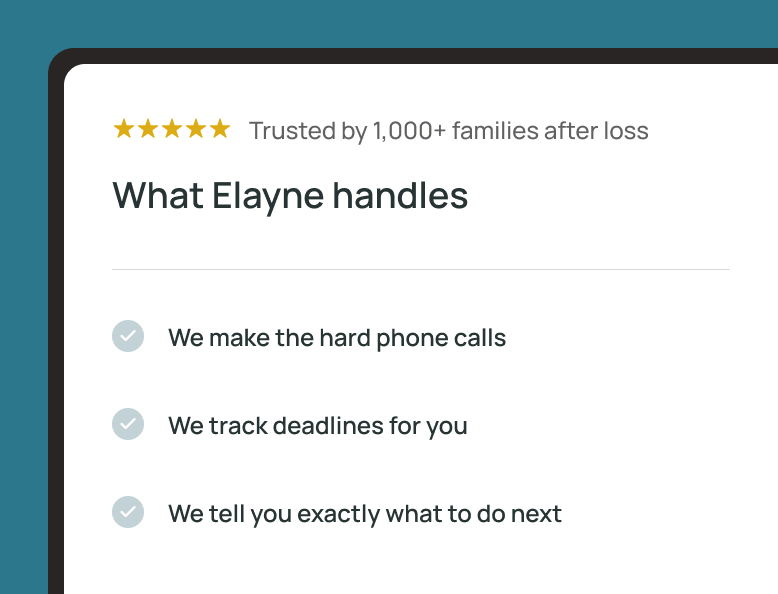Key Takeaways
- Digital assets are part of your estate and should be included in wills and legal plans
- Failing to plan for digital assets can leave accounts inaccessible or lost
- With the right tools, you can include digital asset planning in your estate strategy, even on your own
The Rise of the Digital Estate
Estate planning isn’t just about houses, bank accounts, and insurance anymore. Today, so much of life lives online: photos, investments, email, social media, and personal data.
If something happened to you, would anyone know how to reach your online banking account? Could your family retrieve photos stored in iCloud or Google Photos? Would your cryptocurrency vanish without your keys?
This is where digital estate planning comes in. As part of modern estate management, your online accounts and digital property deserve the same attention as physical ones. They hold emotional, practical, and often financial value.
Elayne helps families navigate these new realities every day. From securing passwords to guiding executors through closing financial accounts after death, the right preparation keeps your legacy from getting lost in the cloud.
What Are Digital Assets in a Will?
Your digital assets include any personal or financial information that exists in digital form. These assets fall into several categories:
- Personal Accounts: Email accounts (Gmail, Outlook), social media (Facebook, Instagram, LinkedIn, X)
- Financial Accounts: Online banking, Venmo, PayPal, Cash App, investment platforms (Robinhood, Fidelity), cryptocurrency wallets
- Business Accounts: Websites, online stores, domains, Shopify, PayPal Business, Stripe
- Digital Collections: Photos, videos, ebooks, music, digital downloads, cloud storage
- Legal and Subscription Accounts: Dropbox, Google Drive, DocuSign, TurboTax, Amazon
All of these are part of your estate and should be referenced in your will or trust. You can even add a digital asset clause, a section that formally gives your executor access to these accounts.
If you’re already reviewing your plan, Elayne’s overview on what happens to a 401(k) after someone dies explains how digital and financial accounts fit into traditional inheritance structures.
Why Digital Asset Estate Planning Matters
Without proper planning, your digital accounts may be inaccessible due to strict privacy laws, encrypted passwords, and company terms of service.
Prevent Account Lockouts
Tech companies have strict privacy policies. Without authorization, loved ones might be locked out of your accounts, even if they have passwords. Elayne’s guide on setting up Google’s Inactive Account Manager shows how you can grant safe, pre-approved access to your most important digital data.
Protect Financial Property
From cryptocurrency to PayPal balances, digital assets hold real money. If no one knows these accounts exist, that wealth can disappear. For example, Elayne’s piece on how to notify the IRS of a death shows why accurate documentation matters for every asset, digital or not.
Save Sentimental Memories
Years of photos and messages can be lost without clear instructions. A secure record of where your memories live—like cloud accounts or shared drives—helps families recover what matters most.
Prevent Identity Theft
Unmonitored accounts are vulnerable to fraud after death. Tools that help set up fraud monitoring or prevent identity theft after death protect both your estate and legacy.
Estate Planning for Digital Assets: Key Steps
Step 1: Inventory Your Digital Life
List all your online accounts: financial, personal, and business. Include login locations, usernames, and recovery details. You don’t need to write passwords in your will, but store them securely elsewhere.
If you’re unsure how to organize everything, Elayne’s after-death checklist is a great example of how to stay methodical and complete.
Step 2: Secure Your Passwords
Use a password manager like Bitwarden, LastPass, or 1Password. These tools offer emergency access features that let trusted contacts retrieve your data safely.
Step 3: Appoint a Digital Executor
Some states now recognize digital executors, a specific person designated to manage your online presence. This role can be separate from your main executor and should go to someone who’s tech-savvy and organized.
Elayne’s post on how to become an executor of an estate after death explains how executor appointments work legally and how to handle overlapping responsibilities.
Step 4: Write Clear Instructions
Decide what should happen to each account type:
- Should social media be closed or memorialized?
- Should your crypto be transferred or liquidated?
- Should your photos be shared or archived privately?
Digital Asset Planning Tools and Options
Some tools to consider:
- Password Managers: Store secure logins and legacy access
- Digital Vaults: Secure important files and keys
- Crypto Estate Tools: Share crypto access safely
- Elayne’s Planning Platform: Organize and share digital accounts in estate plans
You can also speak with an attorney about adding a digital access clause to your estate plan.
Digital Assets and Estate Planning: Legal Considerations
Every state has laws that govern access to digital assets after death. Most follow the Revised Uniform Fiduciary Access to Digital Assets Act (RUFADAA). This law:
- Gives executors limited legal access to a deceased person’s online accounts
- Protects privacy but allows access with explicit authorization
- Requires digital asset instructions to be documented
Not all states recognize digital executors yet, so if you’re unsure, an attorney can confirm local rules.
FAQs
Q: What are digital assets in a will?
Digital assets include online accounts, financial platforms, and stored digital content that should be distributed or closed after death.
Q: What is a digital asset will?
It’s a document that specifies how your digital accounts should be accessed or managed after death.
Q: Can I do my own estate planning for digital assets?
Yes—many people use DIY tools, but complex estates or crypto holdings may require professional help.
Q: What is digital asset planning?
It’s the process of organizing, securing, and legally documenting your online property.
Q: How do digital assets fit into traditional estate planning?
They are included as personal property and managed by your executor, just like bank accounts and physical assets.
Your digital life is part of your legacy. From priceless photos to financial accounts, your online assets deserve protection. Digital asset estate planning ensures your loved ones can access what matters, and prevents valuable accounts from disappearing forever.
Whether you create your own plan or work with an estate attorney, some key points to remember:
- List your digital accounts
- Secure your passwords
- Name a digital executor
- Add a digital asset clause to your will
Estate planning for digital assets is essential. Your future plans should protect your online world just as much as your physical one.
*Disclaimer: This article is for informational purposes only and does not provide legal, medical, financial, or tax advice. Please consult with a licensed professional to address your specific situation.















































